Foreign minister: Georgia successfully coping with challenges in complicated international environment
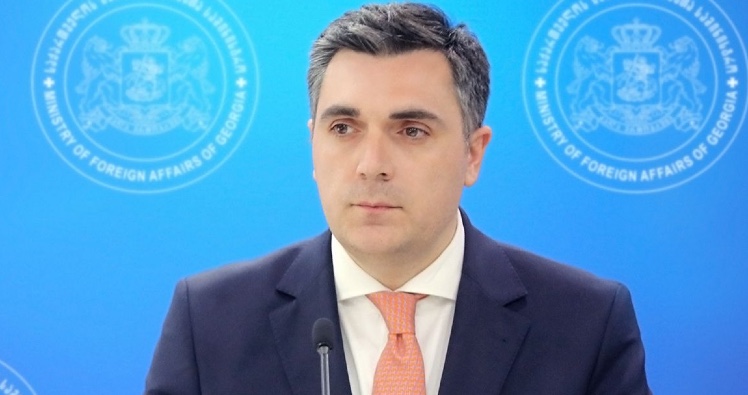
The minister also mentioned as “particularly noteworthy” the fact that a “clear and direct support” for Georgia’s European future was repeatedly voiced in public statements of high-ranking officials of EU institutions and member states, as well as during bilateral meetings.Photo: foreign office.

On Thursday Georgia celebrated Diplomat’s Day, the annual date recognising the work of the country’s envoys and diplomatic services. Foreign minister Ilia Darchiashvili said he believed the “symbolic” date emphasised the “principal cornerstone” of Georgia's foreign policy and the “historical choice of the Georgian nation - fully fledged membership in the European family”.
The minister spoke to agenda.ge about what has been an active and dynamic year on the front of multilateral diplomacy as well, emphasising the Georgian government’s main foreign policy goals, from peaceful de-occupation of the country to implementation of the reconciliation policy with conflict-affected communities, and from European and Euro-Atlantic integration to “maximum use” of the country’s potential and building the image of Georgia as a reliable global partner.
He once again reiterated that full membership of the European Union was one of the “top priorities” of the country’s foreign policy, as enshrined in its constitution. Darchiashvili said it was a “great honour” to be at the helm of the ministry, the performance of which was an “essential prerequisite” for the success of the country. He also noted the office’s role in fulfilling the tasks and objectives the government had set for itself for building a “successful, safe and European” future for Georgia. He also highlighted recent important foreign visits, as well as those involving the prime minister and delivering his messages to the international community.
Q: It’s been over seven months since you took over as foreign minister. You were appointed to this responsible post amid the tremendous challenges facing the world. How would you assess this period?
A: Thank you for your interview. First of all, it is a great honour for me to be at the head of the organisation, the performance of which is an essential prerequisite for the success of our country, and for fulfilling the tasks and objectives, which the Georgian government led by our prime minister has set before itself, and which are directly connected with building a successful, safe and European future for Georgia.
I’d like to take this opportunity and congratulate each Georgian diplomat on their professional day on Thursday and wish them success in the highly responsible positions they hold.
Though not renowned for its very long history and traditions, the Georgian diplomatic corps is distinguished by rich experience and high professionalism. I joined it several years ago, when I was appointed and proudly served, on behalf of Georgia, as ambassador in one of our partner countries. So I am not a new entrant to the Georgian diplomatic service. This allowed me, upon my appointment as foreign minister, to make changes in various areas, which, I hope, have considerably improved the working conditions for Georgian diplomats. I’d like to thank the Georgian prime minister, Irakli Garibashvili, who is a great supporter of our ministry and of all those new ideas and initiatives that are designed to improve the professional conduct of our diplomats. I can assure you that there will be many novelties in this regard.
I came to serve as minister when not only Georgia but also the entire world was going through the tough times, when the impacts of the global pandemic still continued to reverberate, when we became witness to the upheavals, which undermine both the European and global security architecture. In this light, the role of the ministry of foreign affairs in dealing with and overcoming the existing challenges cannot be overestimated.
It needs to be highlighted that despite the challenges facing us, we have succeeded, through the Georgian government’s consistent and responsible policy, in avoiding major threats, and even in scoring certain successes in these turbulent and highly volatile environments, to ensure that the country does not swerve from its stable and consistent development path.
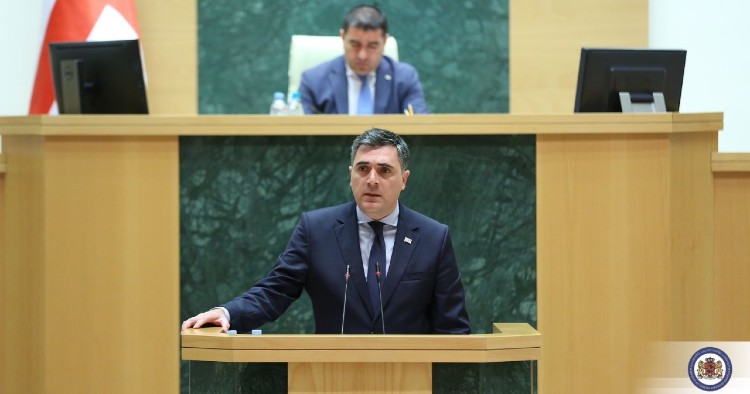 Photo: Georgian foreign office.
Photo: Georgian foreign office.
The Georgian government’s main foreign policy goal is to achieve peaceful de-occupation of the country, implement the reconciliation policy between conflict-affected communities, facilitate European and Euro-Atlantic integration, ensure maximum use of the country’s potential and build the image of Georgia as a reliable global partner – the tasks which we have been successfully moving ahead with over the recent period.
My seven months in office have indeed been busy and eventful, but the goal of overcoming the challenges is highly conditional on effective international support for Georgia, which I have always felt and continue to get from my colleagues - foreign ministers of our friendly countries.
Q: How would you assess the performance of the Georgian diplomatic corps during these difficult times?
A: It will be difficult to give an objective opinion in this case, but judging by the results we have achieved, it can safely be argued that Georgia is successfully coping with the foreign policy challenges even in this complicated international environment. This period is marked by effective steps taken towards fulfilling the main foreign policy priorities as part of the Georgian people’s historic and civilisational choice to become a full-fledged member of the European family.
We have been actively using all international mechanisms to maintain high on the international agenda the Russian occupation of the Georgian territories and the issues relating to the Russian-Georgian conflict. We are also taking consistent steps along the EU integration path, and this year has been really eventful in this regard: our country was granted a European perspective taking the EU integration process to a whole new level. NATO-Georgia cooperation has been dynamic and the Madrid summit brought tangible results; important steps were taken within the scope of bilateral relations with various regional countries, as well as in terms of cooperation with our southern neighbours. We are pursuing dynamic cooperation with our European partners, which, against the background of the ongoing developments, takes on a particularly meaningful focus. We have conducted a great number of high-level visits and have signed important documents with various countries. This year has been active and dynamic on the front of multilateral diplomacy as well, and Georgia has figured prominently at all international forums. As far as you know, Georgia was recently elected to the United Nations Human Rights Council for 2023-2025 and this fact points to the importance of human rights protection to Georgia. While appearing before the parliament within the scope of the Minister’s Hour format, I had the opportunity to speak extensively on the aforesaid issues. Highly intensive have been our relations with Georgia’s key strategic partner – the United States of America. We feel our strategic partner’s firm support. We place a particularly high value on the strong partner relations that have evolved over the past 30 years between our two nations.
 Photo: Georgian foreign office.
Photo: Georgian foreign office.
Naturally, all these successes would be hardly conceivable without the special contribution of our diplomats working at the ministry, and hundreds of others presenting and upholding our interests beyond the borders of Georgia.
Q: You have identified European integration as one of the country’s main national and foreign policy priorities. Your tenure as minister coincided with a series of important decisions, which became the cause of internal controversy and criticism of the government. How would you comment on these decisions?
A: Full membership of the European Union is one of the top priorities of Georgia’s foreign policy and is enshrined in the supreme law of the country – the constitution. Georgia continues its consistent pursuit of this path, carrying out comprehensive reforms to achieve maximum approximation of the Georgian legislation with that of the EU and a high level of institutional integration. On March 3, by submitting EU membership application, the Georgian government has fulfilled the will of the Georgian people, while the European Council’s historic decision of June 23 to recognise Georgia’s European perspective has officially opened for Georgia a door to EU integration and has upgraded our relationship to an absolutely newer level, bringing this relationship within a new institutional framework. Georgia became part of the EU Enlargement Package, which means that the country’s progress will be assessed based on the Copenhagen Criteria of membership. We are also working to ensure that Georgia becomes a beneficiary of Pre-Accession Instrument.
Shortly after the European Council’s decision of June 23, Georgia submitted a specific action plan whereby it confirmed its firm will to fulfil all obligations leading to EU membership. It needs to be highlighted that the ruling team provided an inclusive, open and transparent process to ensure that, through the engagement of parliamentarians, government agencies and civil society, we comply with the European Commission’s recommendations and Georgia is granted a membership candidate status within the shortest possible time.
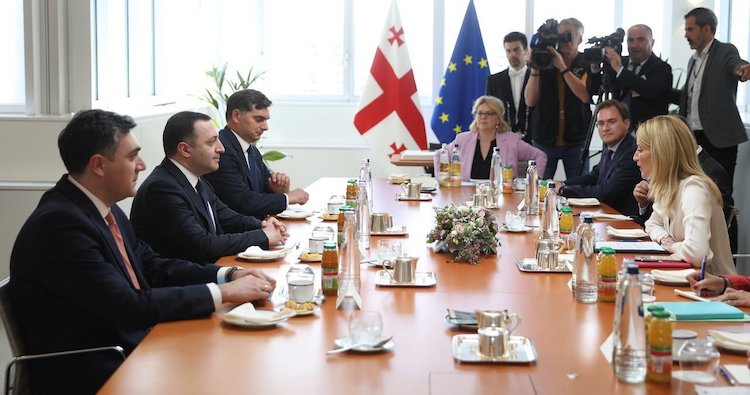 Photo: Government's press office.
Photo: Government's press office.
Particularly noteworthy is the clear and direct support for Georgia’s European future, repeatedly voiced in public statements of high-ranking officials of the EU institutions and member states, as well as during bilateral meetings.
As you know, the first meeting of the European Political Community, initiated by the French president Emmanuel Macron, was recently held in Prague. Along with the Georgian prime minister, the summit was attended by leaders of the 43 European countries. The discussions revolved around the ways Europe should rise to face the challenges currently facing the region and the globe. The very fact of Georgia’s participation in this platform clearly indicates that Georgia is an integral part of the European family and that, without Georgia, there can be no discussion of European security. I’d like to emphasise that one of the very important panels, relating to peace and security in Europe, was co-chaired by the Georgian prime minister. Within the framework of the Summit, the prime minister held important meetings with the president of the European Council, Charles Michel and the president of the European Commission, Ursula von der Leyen. I believe that these meetings will yield tangible results for Georgia’s European integration.
The Georgian delegation, led by the prime minister, also delivered an address at the 77th session of the United Nations general assembly and held bilateral meetings on the sidelines of the session.
Q: As the Georgian foreign minister, which aspects of the speech would you single out for special mention, and how important was this visit to Georgia?
A: The session of the UN general assembly is a forum of global significance, which we always use to bring into the international spotlight the issues of urgent importance to Georgia. Speaking from the UN rostrum, against the backdrop of the current situation across the globe, the prime minister voiced very important messages. First of all, he highlighted the UN’s decisive role in protecting the sovereignty and territorial integrity of the member states. According to him, aggression against the UN member states is still ongoing and Georgia too fell victim to such aggression in 2008.
Speaking about the Georgian people’s courage and resilience, the prime minister highlighted that Georgia, along with international partners, remains committed to advance the cause of international peace and order, which attests our continued contribution to NATO- and EU-led missions.
Referring to the main goal of our foreign policy – EU and NATO membership - the prime minister also reaffirmed the government’s commitment to contribute to this process, including by implementing an ambitious reform agenda and an inclusive process of implementing the reforms.
We are sparing no efforts to further deepen our relations and cooperation with Georgia’s partners – the EU, NATO and the US.
During his meeting with the UN secretary general, António Guterres, the prime minister discussed the security situation in the South Caucasus region. With the aim of achieving peace and stability in the region, he reaffirmed the commitment to further make efforts as a mediator between Azerbaijan and Armenia. In his address to the UN, the prime minister clearly outlined his vision of the Caucasus as a region of opportunities. He emphasised the importance of increasing the country’s transit capabilities that will contribute to the development of the region, in general. Georgia is actively cooperating with the EU to attract as many successful projects as possible to the benefit of our region.
While appearing before the UN session, the PM underlined that the country continues to progress despite the heavy impacts of the occupation. This progress is underpinned by our reforms the results of which are reflected in international rankings. The prime minister also addressed our Abkhaz and Ossetian brothers and sisters by saying we will build a prosperous state together.
Q: To what extent can we highlight the plans for the continuation of peace mediation between our two neighbouring countries, commenced as a result of the prime minister's initiative? In this regard, I would also like to ask you about the historic visit of the president of Azerbaijan.
A: Georgia is interested in peace across the region, which would guarantee stable and sustainable development of our countries. This is the major objective of the prime minister’s initiative he announced from the UN tribune last year - the South Caucasus Peace Initiative. The positive role of Georgia in this process has already been highlighted through the successful steps taken by our country. A pivotal agreement, acceptable to both countries has been reached through the mediation of the prime minister. I would also like to recall the fruitful meeting of the ministers of foreign affairs of Armenia and Azerbaijan in Tbilisi.
We wish peace to prevail in the region. For this, we are always ready to host our southern neighbours and support them in strengthening constructive dialogue in every possible way. I would like to emphasise that this year, the prime minister once again announced the South Caucasus Peace Initiative from the UN tribune, which in the future has a great potential of becoming the cornerstone of peace in the region. This is an important incentive and our goal is the sustainability and stability of the region, as well as working to promote the development of various social and economic projects.
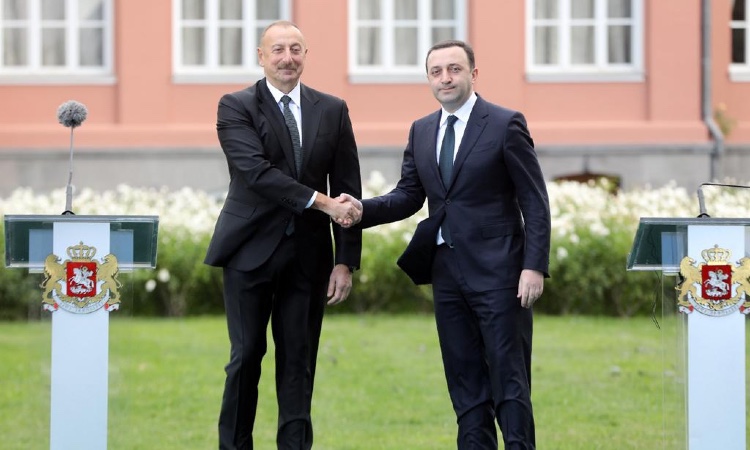 Photo: Government's press office.
Photo: Government's press office.
With regards to the president Aliyev’s visit, it certainly has proved to be outstanding, very timely and significant. As you know, a close strategic partnership and special friendly relations have been established between Georgia and the Republic of Azerbaijan. There is a very wide range of issues in our bilateral relations agenda that were discussed during the above mentioned visit. Global projects such as Baku-Tbilisi-Ceyhan and Baku-Tbilisi-Erzurum gas pipeline, Baku-Tbilisi-Kars railway project should definitely be highlighted among them. Georgia and Azerbaijan are assigned a special role in terms of the main transit function in the region and thereby ensuring the sustainable and stable development of the region.
Q: While addressing the audience at the UN general assembly, the prime minister emphasised economic development, education and increasing transit potential of Georgia. We would like to hear your opinion about this topic.
A: You are right, the discussions of this year's UN session were extremely important considering the difficult political and economic situation created in the world. Georgia is developing rapidly economically, the economic growth last year and this year has reached double digits and the prime minister has informed the international community about this. As for education, this field represents one of our main priorities and we are constantly investing significant resources in it. Against the background of the tremendously complicated situation across the world in terms of energy security, Georgia is still able to fulfil its function and role in the matter of energy security. We are constantly working with our European and Central Asian partners to further strengthen and grow our role as an energy security player in the region. In the UN, the transit capabilities of the country and the efforts made for their development, so that Georgia becomes a connecting bridge between the West and the East, were noted. The development of transit functions is an important part of our daily activities, both by persuading international partners to invest more in Georgia, and by improving the infrastructure of transit functions on the ground. From the UN tribune the head of the Georgian government accentuated Georgia's capabilities, as well as the country’s prospects in this direction. We are already discussing relevant projects with the European Union. Successfully implemented, this process will further connect our region with the bloc.
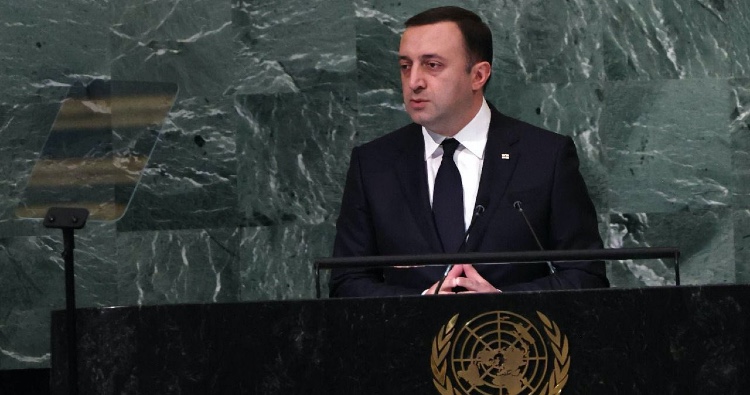 Photo: Government's press office.
Photo: Government's press office.
Q: You have recently returned from the United Arab Emirates following the visit of the Georgian delegation led by the prime minister. To what extent do you think it is significant to enhance cooperation with countries of the Middle East?
A: Deepening bilateral and multilateral relations with East and Southeast Asia, the Middle East, Latin America and the countries of the African continent is high on Georgia’s foreign policy agenda. Within the scope of high-level meetings, we discussed all the core aspects of existing fruitful cooperation between the two countries. We also highlighted the high level of political dialogue between the countries, evidenced by the visits carried out in recent years. It is also noteworthy that the negotiations aimed at the establishment of a free trade regime between Georgian and the UAE have entered an active phase. The launch of a free trade zone will create a favourable climate for the promotion and development of economic and trade relations between Georgia and the United Arab Emirates. The visit was very productive, as we had an opportunity to fully exploit the great potential in the fields of tourism, investment, energy and transport.
Q: Finally, I cannot but ask you about Ukraine, because this topic has unfortunately become a matter of domestic political controversy.
A: Georgia and Ukraine enjoy a strategic partnership based on long-term friendship and close people-to-people ties. Both countries have made a clear choice in favour of joining the European family. Georgia's support for Ukraine's sovereignty and territorial integrity within its internationally recognised borders is irreversible.
Since the beginning of Russia's full-scale military aggression against Ukraine, Georgia has been supporting Ukraine both politically and diplomatically, as well as through providing humanitarian assistance. Solidarity with Ukraine has been expressed not only by practical support in bilateral formats, but also by Georgia's firm positions within all international platforms. Since the inception of the war, the number of statements and declarations supporting Ukraine in international organisations has exceeded 400.
In addition, since the outbreak of the war, Georgia has provided significant humanitarian and financial assistance to Ukraine, including to more than 28,000 Ukrainians who have arrived in Georgia, through various social programs and the establishment of Ukrainian-language classes at schools. And Ukrainian minors and their accompanying persons have been hosted for rehabilitation programmes in Georgia as part of the support.
 Tweet
Tweet  Share
Share